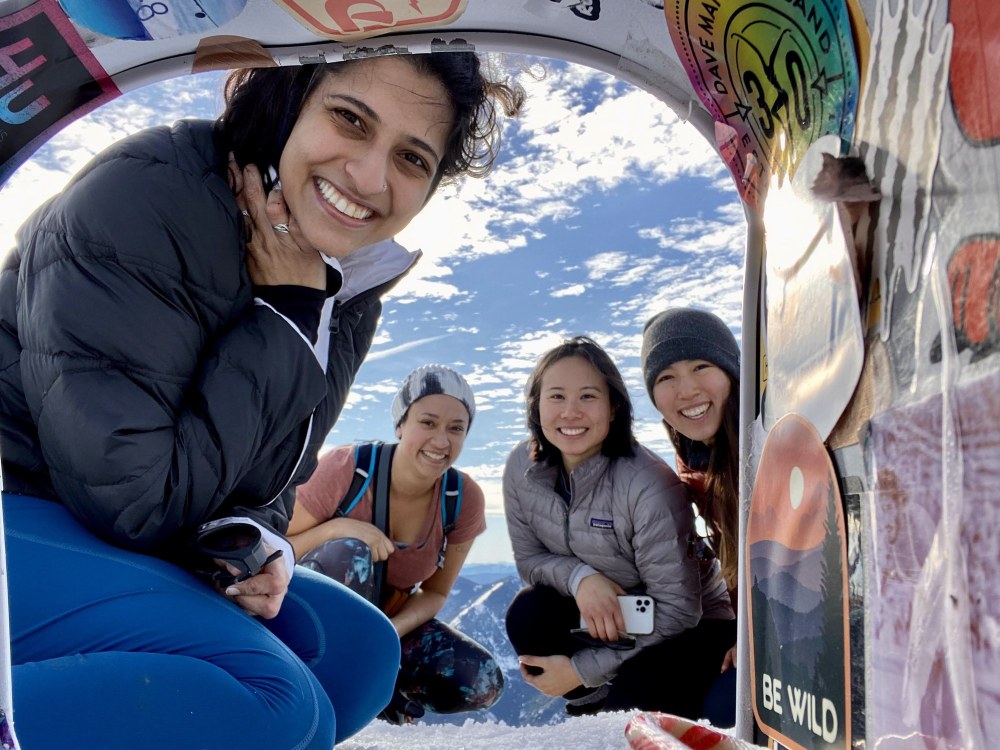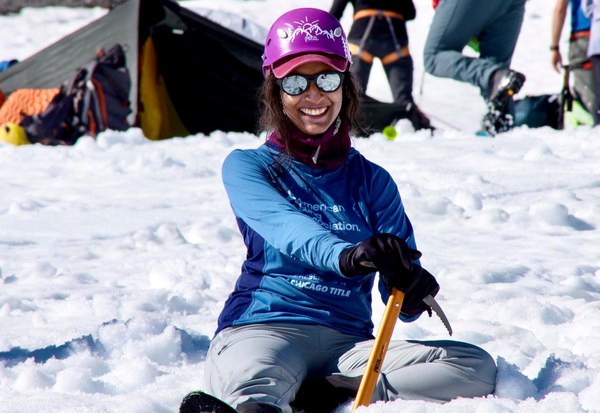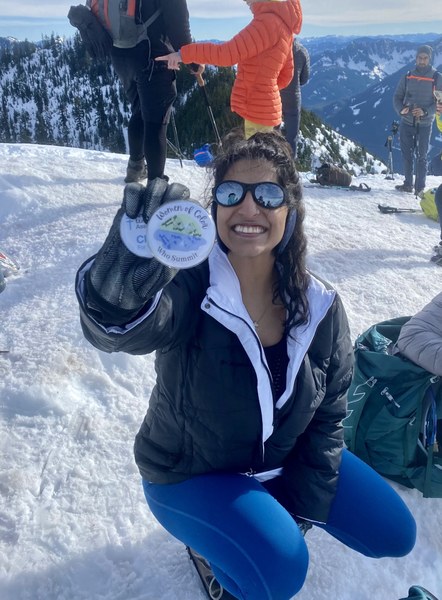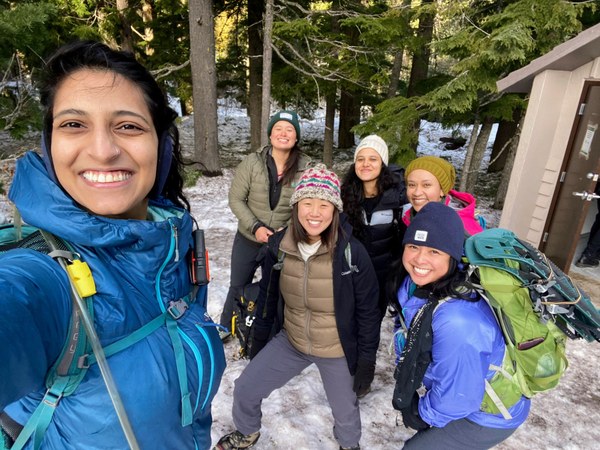
Nash Maz is an Indian American hiker and climber breaking ground with an all-women of color climbing attempt on Tahoma (Mount Rainier). She’s put together a team of 12 women, known as Women of Color Who Summit, to raise funds and awareness for the minority populations disproportionately affected by COVID and other lung diseases. As someone who overcame extreme health conditions as an infant, and as a true Washingtonian with more than 200 state hikes under her belt, Nash is uniquely positioned to inspire change through education and advocacy.
What first drew you to the outdoors?
I didn't grow up playing outside. Like many kids, I grew up playing soccer, but I definitely had no athletic ability. I was actually born in Saudi Arabia to Indian parents, and I was hospitalized in India for the first two years of my life; I remember nothing from this time but I have all of these crazy scars all over my body that hold that history. I feel very lucky to be alive to tell the story. As soon as I got better, my parents immigrated to America. We lived on the East side of the country for only a bit before moving to Washington and I have been here ever since. My earliest memories in the U.S. are seeing Mount Pahto (Adams) and Mount Tahoma (Rainier) from my bedroom window.
A few years after college graduation, I had a huge life shift and one day was like, I need to do something that’s going to challenge me. I want to be a mountaineer!
My partner was very supportive from the get go and took me out on a handful of hikes. I'd never gone on a hike before. Then, in true Nash fashion, I became so single minded about it. I committed to doing 200 hikes in Washington, just so I could say something like, “Hey, look I am a diehard Washingtonian, not just an immigrant.”
When I completed the 200 hikes, which took about three and a half years, I was like okay, now I can be a mountaineer. I thought those hikes were the prerequisite.
What was your first big climb?
I started training and climbed Koma Kulshan (Mount Baker) with a guide – my first mountain. It was just the most exhilarating feeling ever. I did Pahto and Loowit (Mount St. Helens), and then I did my first Tahoma attempt. I stopped at like 12,200, which sounds so close, but it was definitely hours away and I was so sick from the altitude. I had my eyes set on Tahoma for so long, but turning around was definitely the right choice.
Why I got home, I comforted myself with this very silly song:
You are such a loser.
Good for you.
Losing is something a lot of people can't do.”
I definitely listened to that song because it was a choice to turn around and to choose to put it all out there, win or lose. I was grateful for the chance to try.

Have you ever reflected at all on the fact that you thought you needed to do 200 hikes before you felt legitimate enough to climb a mountain?
In some ways that speaks a lot to how my brain works. I truly feel that I have to earn everything, I can't just show up and feel worthy or ready or prepared. I have to hyper extend myself and dial in and have whatever it is be the only thing that I think about in order to feel like I should be there.
It also speaks to the broader outdoor culture and to imposter syndrome. No matter how much prep work I do, it’s hard to feel a sense of belonging. I don't know how to show up as my authentic self. I crack jokes in situations where I feel uncomfortable [as the only brown person] just to make myself fit in.
Even though I loved it, my first climb of Kulshan felt kind of like crashing a retirement party. We had me plus probably 13 men at retirement age. It was like a very different experience from what I'm now trying to do to all women of color. These retired men were great, but gave me no sense of community. And not that they didn't make me feel welcome, because they did try, in a daughterly way. But it's hard to not see anyone who looks like you in an entire hobby years on it.
It can be hard to understand the impact of being an immigrant and being a woman of color; to never see yourself represented in these spaces. A climb where everyone looks like you is a very different mentality. To be welcomed in a way that you want to be welcomed, and to be loved the way you want to be loved, is a big part of feeling belonging. You are constantly trying to prove that you do belong through experience and skill. It makes a huge difference to have shared experiences with people who look like you.
When did you come up with the idea for an all women of color climb? How did the team come together?
I took a year off after my failed Tahoma attempt, then started doing Climb for Clean Air fundraiser climbs. I’ve really enjoyed those experiences. I wholeheartedly believe that if you can show someone how passionate you are about something, they will instantaneously be just as passionate as you are. That shared glimmer in people's eyes – I live off of that. Doing these climbs gives me the opportunity to connect with others in that way.
I’ve done many fundraising climbs, and have been thinking about how impactful it would be to have an all women’s team, specifically all women of color. The team really came together because I was introduced to Theresa Silveyra by a mutual friend. She had done a 30 Before 30 fundraising Project on Wy’east (Mt. Hood), and I told her my idea and asked if she thought it was possible. Theresa, who I barely knew, was so encouraging and so empowering. She said, “You need to do this and we're going to help you make it happen.”
She posted on a couple of different Facebook pages and over 40 women reached out. The interest skyrocketed and I was absolutely humbled. I had no idea so many women were feeling the need to connect in the same way as me.

Tell us more about the team.
I've only met some of the women once, and some of the women I haven't met at all, and yet they're the people I'm communicating with the most on a daily basis now. The fact that we have so many similarities that are unspoken, just beneath the surface, is mind blowing to me. There's such a sense of like kindred spirits amongst us. We have very similar stories in regards to being immigrants or being women of color or being in a sport that doesn't feel like it's ours. I'm shocked at how quickly we hit it off.
I’m realizing that feeling connected with women of color has been a huge void in my life. Growing up, I didn't have many brown friends. I didn't have a lot of Indian friends. I didn't have a lot of Asian friends. I had so aligned myself with anyone around me that could make me feel and look more American - giving me proximity to whiteness. I was denying myself the movies, the food, the culture that is so strongly associated with being Indian. I don’t want to do that anymore.
These women have been so much so inspiring to me. Every new detail I learn about them and what they're doing in their communities and in their love relationships and hometowns blows me out of the water. We’re introducing each member of our team every Wednesday on our Instagram. I’d love for everyone to follow along and meet our community of women and lift them up in the ways that they have lifted me up.
How are you prepping for the big climb, and how can people support you and the team?
We have 12 women and a goal to raise $5,000 each. We have multiple fundraising events coming up that we are hoping people come to, whether virtually or in person. And we are aggressively hiking and training. We put weight and strength training needs in the group chat. We're trying to plan hikes for once every weekend or go run the stairs in the neighborhood.
I think the big ask is to spread the word: 37 million people are suffering from lung disease in the United States. Especially with the pandemic, we know that minority populations are disproportionately affected by COVID and other lung diseases. Our climb is not just about the mountaineering piece; it is about educating people about how communities of color are impacted by poor air quality, asthma, bronchitis, COPD, and now COVID. We’re trying to share that hiking is an opportunity for people to strengthen their lungs. Connecting those two causes seems so intuitive.
Your passion for this work is so infectious. Thank you for sharing it with us and for creating such an inspiration team and mission.
I believe wholeheartedly that if you can show someone how passionate you are about something, you will instantaneously have them be just as passionate. That shared glimmer in people's eyes – I live off of that!
Most of my hiking has been alone, but I feel so connected to people even when I'm hiking by myself. A huge piece of understanding myself in my early twenties came from those hours alone on the trail. A lot of it was about sitting in this discomfort and unrest within me. Those feelings were quelled by the outdoors – the sense of calm became addictive. I know that that's the case for so many people. I feel like the outdoors is such a great place to feel connected to the earth and your purpose and your life. I want to do everything I can to make my teammates and other women of color feel empowered and elevated. I want them to have opportunities that I have never had, even just a few years ago.

 Kristina Ciari Tursi
Kristina Ciari Tursi